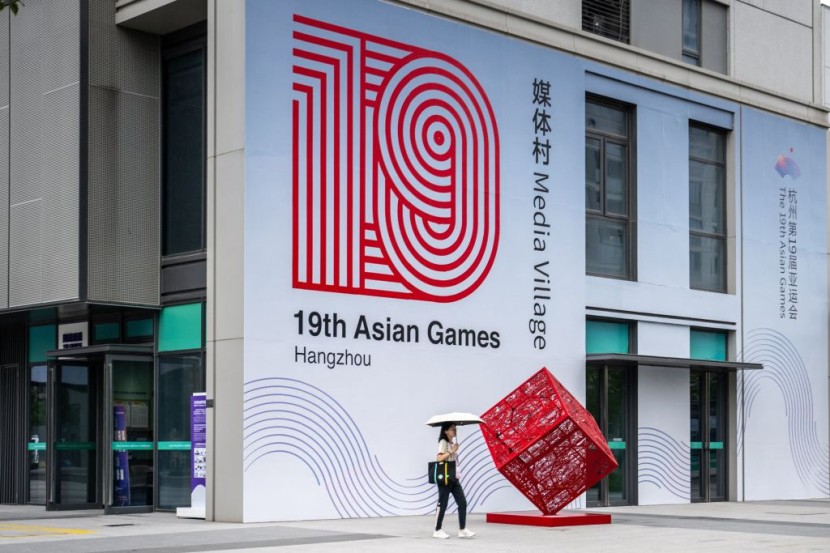
(Photo: by PHILIP FONG/AFP via Getty Images)
A woman walks past a logo of the 2022 Asian Games at the media village in Hangzhou, China's eastern Zhejiang province on September 21, 2023.
Lin Yuwei and Wu Yanni's racing numbers together make the number "64," which is a typical reference to the incident that took place on June 4.
In China, talking about the incident is still frowned upon, and the government frequently removes any references to it from the internet.
Hundreds of pro-democracy protesters were killed by the military in Beijing in 1989.
Although the exact number of deaths that day is still unknown, estimates from human rights organizations range from several hundred to several thousand.
After Ms. Lin's gold-winning 100-meter hurdles competition at the Asian Games, the athletes hugged one another. In the picture, she was wearing lane number 6 next to Ms. Wu, who was wearing lane number 4, as reported by BBC News.
On Weibo, one of the most popular social networking sites in China, many congratulated Ms. Lin, but posts with photos were replaced with gray squares.
However, some Chinese news stories still display a picture of the two sportsmen, suggesting that the image has not been entirely removed from the internet.
The Asian Games, which are presently taking place in the Chinese city of Hangzhou, have seen China win close to 300 medals so far. It is scheduled to go till October 8.
Read also: EU Calls for More Balance Trade with China, Expresses Concerns Over Beijing's Business Environment
The Tiananmen Square Massacre's Relevance
The Tiananmen Square massacre is a topic that should not be discussed in China because younger Chinese generations are growing up knowing very little to nothing about it.
The government has strict control over the internet, thus posts about the massacres are frequently deleted from it.
The massive, student-led pro-democracy protests at Tiananmen Square in Beijing were ultimately put down by the Communist regime in China. To put an end to the protests, troops and even tanks were sent.
Human monitors who make decisions about whether content should be blocked are used in China's internet censorship campaigns.
Weibo claimed to have hired a thousand "supervisors" in 2017 who had the responsibility of reporting information that was "pornographic, illegal, and harmful." Weibo, the biggest social media network in China has 600 million monthly users.
On the eve of the 33rd anniversary of the massacre, a popular Chinese influencer's live stream last year came to an abrupt end after he showed his audience a vanilla log cake that looked like a tank, making reference to the famous image of the so-called Tank Man, which depicts a civilian with shopping bags blocking a line of tanks.
China exerts strict censorship on topics it deems sensitive and at odds with the party's principles and ideology, as well as on criticism of the Communist Party.
The regulations have in the past resulted in the censoring of what could seem to some to be innocent photographs, like women's cleavage and males posing for photos in lingerie as a trick to increase sales on social media.
Related article: Why New China Anti-Espionage Law Should Concern Foreign Businesses, Citizens-From Bounties to Stricter Rules
© 2025 HNGN, All rights reserved. Do not reproduce without permission.








